Your domain, hosting and email setup are all essential parts of your website strategy, but it can be pretty complicated to understand how they all interconnect and work together.
In this guide, we'll talk about all the different elements of your domain, email and hosting setup, what they all are, how they work, and what the best options are for you. We'll talk about:
Once you've found out more about how everything works, and how all these pieces fit together, you can decide what setup is going to be right for you and your company.
Domains
When thinking about your setup, your domain is the place to start, as this is essentially your website's address, and will set the tone for your site, as well as be a signpost for your customers.
What is a domain?
You probably already know that a domain is the address you type in to visit a website, so for Edge of the Web, our domain is edgeoftheweb.co.uk.
But what you might not know, is that when you register a domain, the address is ALL you get.
In order to have anything else running on that domain, like having an actual website or email addresses, you need to have hosting and an email package in place.

How do I choose a domain?
The best domain names are simple. Remember that people are going to need to be able to hear or see it, and remember how to spell it, so it's good to avoid overly long domains, or ones with complicated spelling.
Of course this can be really difficult if your company name is long or awkward when written.
For example, if we were called Orange Edge, the domain orangeedge.co.uk looks odd, and it's pretty likely that people would mistype the double "ee" in the middle.
If we were called Fantastical Digital Agency, fantasticaldigitalagency.co.uk is a bit too long for people not to get lost halfway through.
So, best to keep your domain as simple as you can, and to make sure it's a clear signpost to who you are or what you do.
Does my domain name help my SEO ranking?
According to Google, your domain name shouldn't make a difference to your ranking. But in practice, it actually can have an effect.
This is because Google is always trying to provide users with the most relevant result for their query. So, if your company or domain name is also a significant keyword for your business, Google may not be sure whether that user is searching generally, or looking for you specifically.
For example, let's say you were a dog walker, and you called your business "Dog Walker Ltd" and registered the domain dogwalker.co.uk. When someone then searched for "dog walker", Google doesn't know if that's a general search, of if that person was looking for Dog Walker Ltd.
If you want to use this strategy when choosing a domain name, you'll need to be very careful to make sure that the words you're targeting are absolutely relevant to the service you offer. After all, that's what Google is all about - relevance.
What extension do I need?
Your domain "extension" is the end bit, so for Edge of the Web, it's .co.uk. You can get all sorts of domain extensions, from the universal .com, .org and .net, to unusual ones like .club or .today.
Generally, we always advise that you try to use an extension that's specific to your market.
If you only work in the UK, .co.uk is usually the best bet. If you're global, a .com might be a good choice. Or if you are a charity or community organisation, .org.uk is a good option.
We usually suggest that people avoid the more random extensions. They're fine if your website is a personal project, but if this is for your business, the .xyz type extensions look a little cheap and unprofessional.
How do I register my domain?
There are loads of domain registrars, and they pretty much all offer the same service when it comes to purchasing your domain.
Because each domain is unique, you will need to make sure your ideal domain name is available. Almost all registrars have a tool that allows you to search for your perfect domain name to see if it's available, and give you options for alternatives if it's not.
Even if your ideal domain has been registered by someone else, you may still be able to purchase it.
Visit the domain you'd like to use and see if there's actually a website there, or if there's a "Domain for sale" page.
There are companies that bulk register domains so they can sell them on at a mark-up. They're usually MUCH more expensive than purchasing from a registrar, but if you're desperate to get your first choice domain name, you can always see if they're willing to sell.
Do I own my domain?
Domains can't actually be bought, you can register a domain for a set period of time, usually between 1 and 10 years, but at the end of that period you will need to renew it if you plan to keep it.
You'll also get email reminders every year when your domain is up for renewal.
These get sent out regardless of whether your domain is set to automatically renew or not, but if you're not sure, just log into your domain control panel to check, or ask the company that looks after your domain for you.
If you decide not to keep your domain, you can set it to expire at the end of its registration period, which means it will be available for someone else to purchase.
Hosting
Hosting is one of those services that lots of people have heard of, but don't really know much about.
But it's actually the essential service that keeps your website running, and it's often hosting that's the issue if your site goes offline.
What is hosting?
Hosting is the service that holds your website files, and ensures that when someone puts your domain into their web browser, they actually see and can interact with your home page.
Your site is "hosted" on a web server, which is constantly running so that your website is always available.
There are lots of different types of hosting, different types of servers and different hosting companies, but they all essentially do the same job.
Shared hosting means that your website sits on a server with hundreds of other websites. This is usually the cheapest form of hosting.
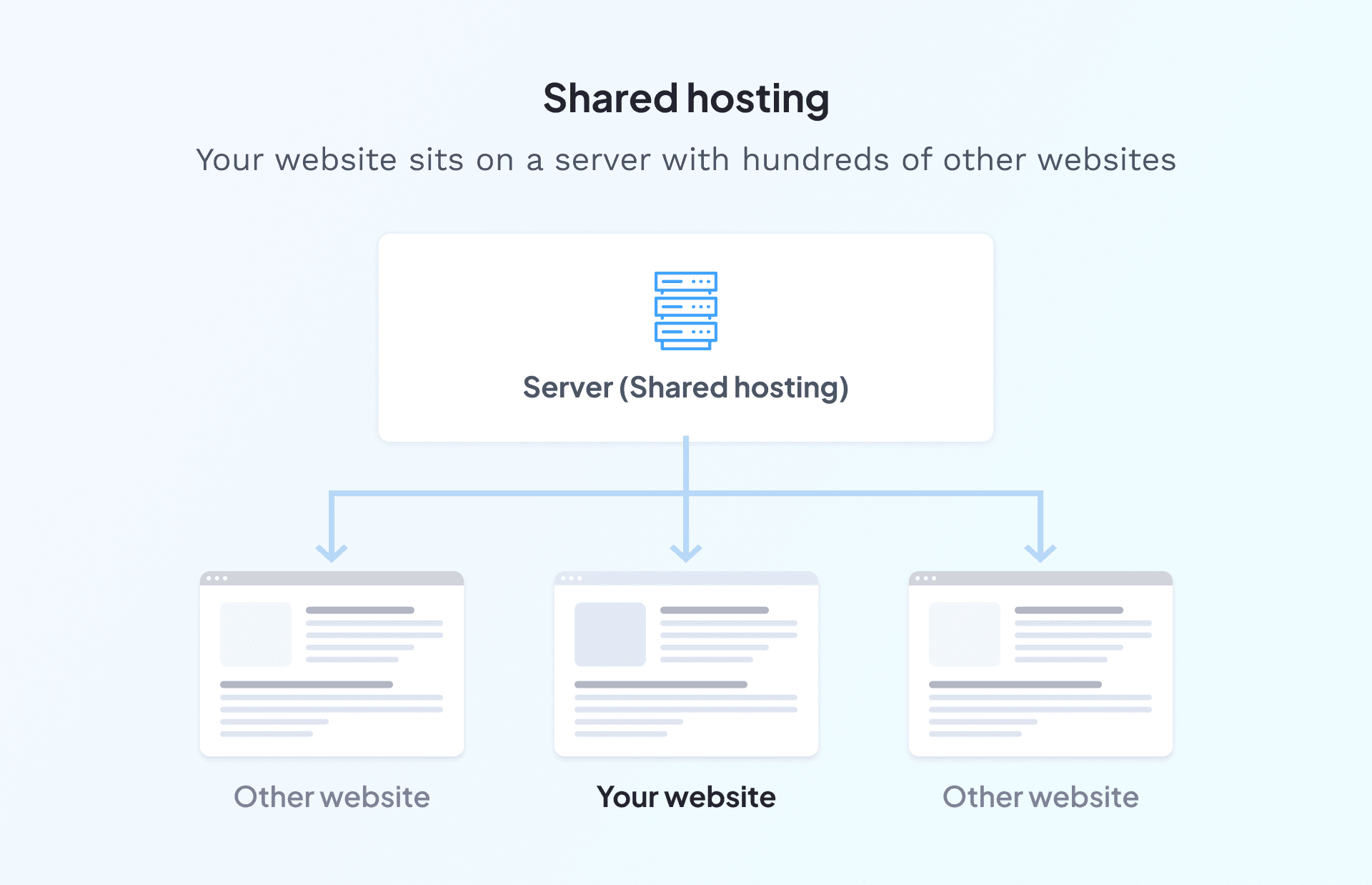
Dedicated hosting means that your website sits on its own individual server. This is usually a more expensive form of hosting.
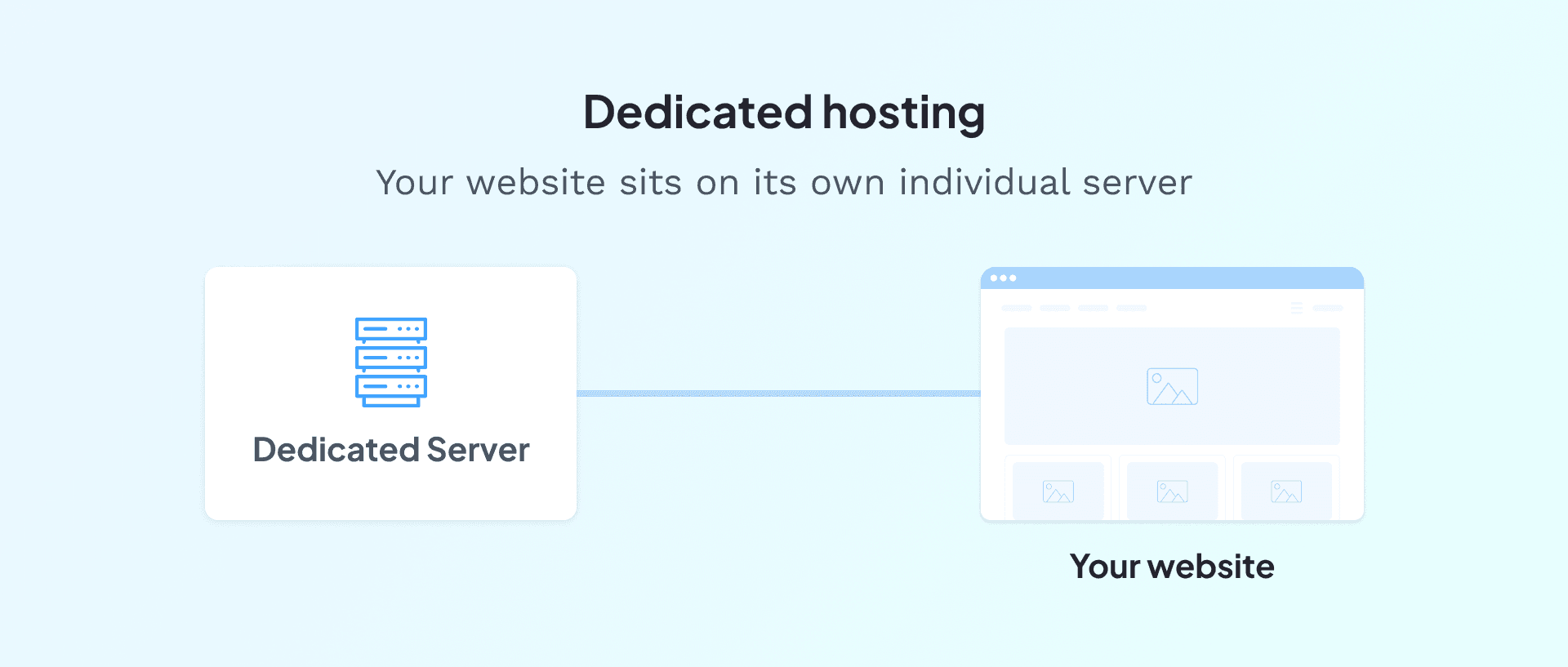
Cloud hosting means that your website files sit on a virtual server - not a physical server. This typically allows more flexibility, and can be considered to be more secure as they don't rely on physical hardware which can fail.
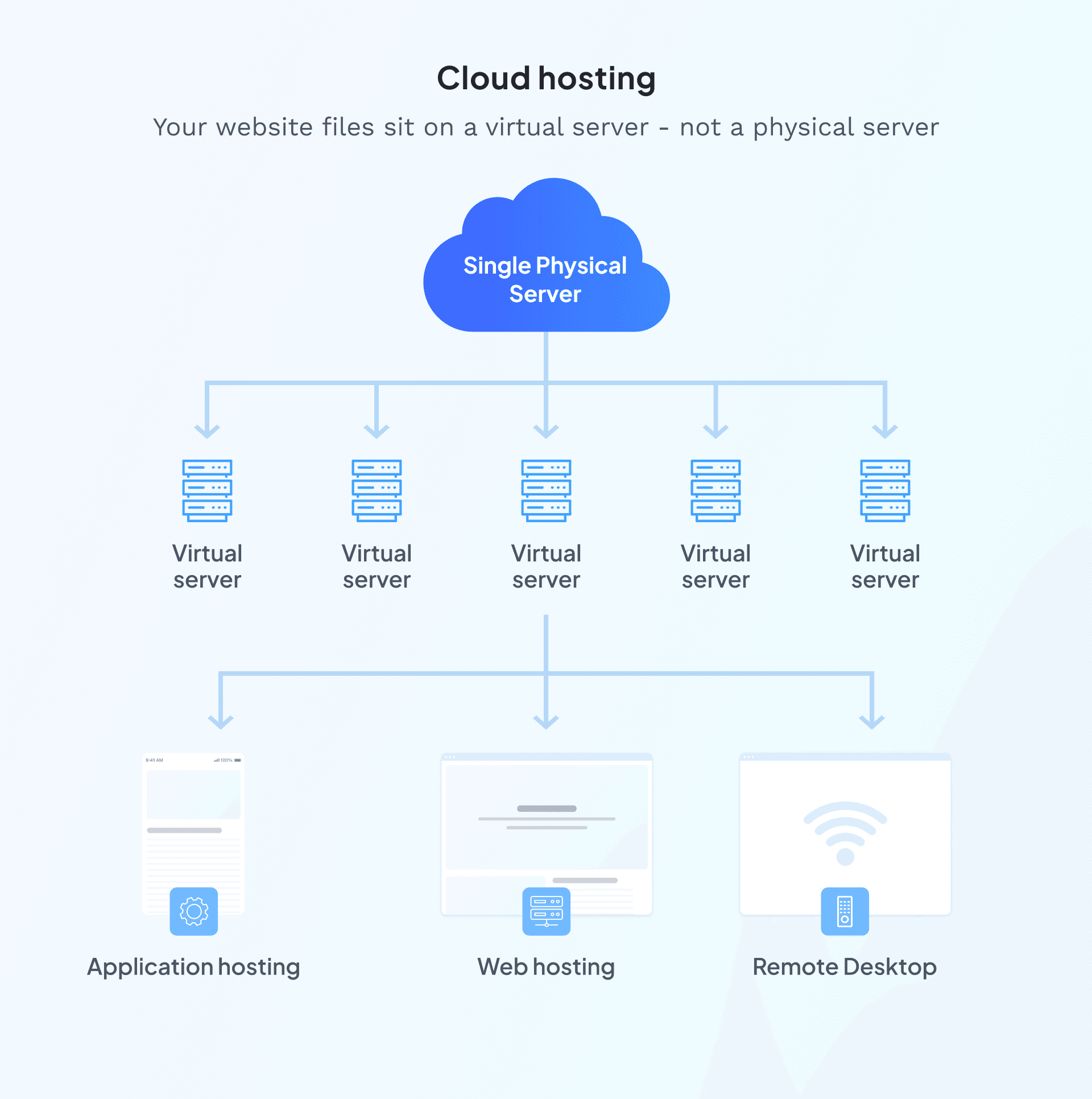
What type of hosting is right for me?
We are a little biased on this front, but we think that Cloud hosting is the best solution for the vast majority of clients. It's not overly expensive, and provides security and flexibility that the other solutions sometimes lack.
Shared hosting is notoriously unreliable - particularly if you are using it for your emails as well as your website hosting.
All it takes is one person on your server to use the password "password", get hacked and start spamming, and you will find your emails are blacklisted too.
Dedicated hosting can be great, but it's generally pretty pricey, and it's not really necessary for the vast majority of websites.
Who is my host?
Asking "who is hosting my website" is actually NOT a silly question.
For example, Edge of the Web provide hosting for our clients, but we don't actually own the servers ourselves, they're provided by a 3rd party.
That's because you need to have a lot of infrastructure in order to have servers running constantly.
You can't just set up a desktop computer and hook it up to the web (well, technically you can, but this would be VERY insecure!), you need dedicated servers running the correct web server software.
You need those servers to be located in a secure data centre, with air conditioning, backup services and generator power in case something goes wrong.
Few design agencies have those facilities in-house, and most of the time the people you're paying to host your website are paying someone else in turn to use their data centres and infrastructure.
But there is a bonus to having hosting like this.
Mainly it means that you never need to worry about managing your hosting yourself.
Many of the better hosting companies aren't really suitable for someone who isn't a developer or an IT expert, so having a technical contact managing the hosting for you means that you can get the better hosting service without needing to train as a server administrator yourself!
It also means that should anything happen with your website, regardless of whether it's a server issue or a site issue, you can simply contact your digital agency and let them handle everything.
SSL
You may have come across the term SSL in regard to hosting, so here's a bit more information about what they are and how they work. If you want a more in-depth guide, you should check out our article on SSL certificates, which can answer all your questions.
What is an SSL certificate?
SSL stands for Secure Sockets Layer, and it's a certificate you can add to your web hosting that adds an additional level of security. Essentially it encrypts data that's sent to and from the website.
Why do I need one?
In the past, SSL certificates were really only needed for websites that took payment, or dealt with sensitive information, but recently browsers have been pushing for most websites to get an SSL certificate.
You may have noticed a grey "Not Secure" message appearing in your browser's URL when you visit a website, that means that the site you're accessing isn't using SSL.
When you have an SSL certificate, you get the padlock symbol instead.
What if I don't get one?
SSL certificates are required for sites that process payments, but if your site doesn't sell things or process sensitive data, you technically don't HAVE to have one.
However, we always advise that you do. It's not a big expense, and it ensures your site looks trustworthy when people visit.
It also gives you a small SEO boost (SSL secured sites are preferred in most search engines).
Many browsers are now making more aggressive moves to push websites into using an SSL certificate, such as displaying full page warnings to users trying to navigate to an unsecured website.
So getting an SSL certificate is becoming more important, as you don't want visitors thinking that your website isn't safe to use.
Email is such a fundamental part of everyday life, it's rare that you actually need to think about what they are or how they work.
But when you're setting up a website, a bit of email knowledge goes a really, really long way.
What is email hosting?
Everyone knows what emails are, but not a lot of people realise that there are different ways of setting up your email service.
3rd party emails are where you run your emails through a third party provider, so you'd be using an address like mybusiness@gmail.co.uk or thiscompany@outlook.com.
Website provided email is when you get emails alongside your web hosting package. These are typically free (or at least pretty cheap), and are generally part of a shared hosting server solution.
Dedicated email services include Google Workspace or Microsoft 365. These paid for services allow you to use addresses at your personal domain, but run them through a dedicated email service.
Exchange server emails are usually only required for big companies with lots of email addresses to manage. An exchange server is a lot more complex to set up, but can provide a much higher level of security.
There are also two different ways to connect to your email: IMAP and POP3.
IMAP means that your email is stored on your email server, and your email program simply copies all that information to your computer or device.
This is the setup we recommend to people, as it means that you can access your emails on multiple devices.
The downside of IMAP is that because your emails are stored on your server, you can max out your available space, so you may need to have regular clear-outs of your email, or expand your mailbox capacity.
With POP3, emails are downloaded from your server onto your device. They aren't copied, but removed, so the email is not stored on your server, but on your device. This makes it more difficult to use across different devices, but means that you can access them even if you aren't online.
But with POP3 you aren't ever going to max out or need to expand your mailbox storage, as you're downloading the emails from your server each time you connect to it.
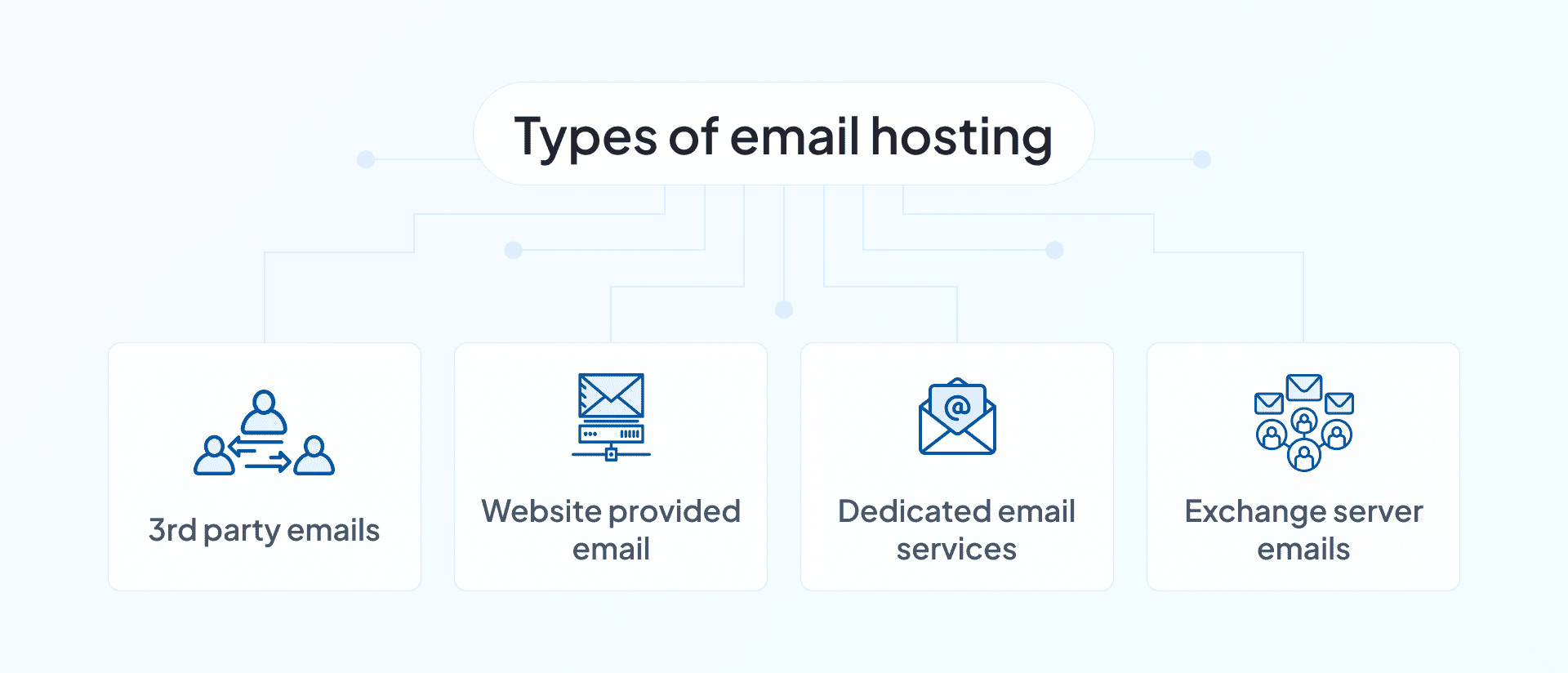
What is the best type of email hosting?
We believe that the best type of email hosting is a dedicated service. Microsoft 365 and Google Workspace are paid services, but they are much cheaper and easier to run than an exchange server.
They also provide way more storage and security than a free service, and you can still use emails at your own domain.
When you use Workspace or 365, you can use gmail.com or outlook.com to access your emails in your browser, or you can run them through an email client (you can find out more about those below).
Typically setting up your emails through these systems is very quick and easy, and if you do decide to use an email client as well, you generally only have to enter your email address and password for the account, instead of having to input lots of complicated settings.
How can I access my emails?
As well as different email hosting setups, there are also lots of different programs you can run your email through. Here are a few different ones you might be familiar with:
- Thunderbird
- Windows Mail
- MacMail
- Outlook
These are often called "Email Clients", and they're what you interact with in order to read, write and organise your emails.
You can also use services like Gmail and Outlook.com, but these are much more efficient if you are using Google Workspace or Microsoft 365 respectively.
Does everyone need to use the same setup?
Every email at your domain will need to use the same service, so you can't have one person using an exchange server, and someone else using the free service with your hosting.
However, you can choose different email clients, so for example, one person could be using Thunderbird, and someone else could be using MacMail.
How do I set up my emails?
And this is where things start to get complicated!
There's no single way to set up your emails, what you need to do will vary depending on what sort of emails you have and what email client you're running them through.
Generally, to set up email on your email client, you'll need the following details:
- Email address and password
- Incoming and outgoing server information - this is usually mail.yourdomain
- Connection type - usually None, SSL or STARTTLS. (It's important to note that the SSL in this case is about your email server, not your website, so it's possible to have an SSL certificate on your website, but NOT use it to connect to your email.)
- Authentication method - usually Password Authentication or Normal Password
Sometimes you'll also need to have Port numbers for your incoming and outgoing servers.
However, if you are using 365 or Workspace, many email clients will have a simple login option where you can enter the email and password for your email account, and the mail client can take all further details directly from the email provider.
If you're struggling to work out exactly what you need to do to set up your email, your provider may or may not be able to help you.
Remember that the process is different for every possible type of setup, and your provider won't necessarily be familiar with the program that you're using.
It's often best to use the "Help" section within your email client, or have a google to see if you can find a help article online.
My email isn't working
The vast majority of the time, if your email isn't working properly, it's because the settings aren't quite right. And that's always the first port of call if you're having trouble.
If you are having trouble sending emails, and are getting bounce back messages to say that your emails are being rejected, the most likely cause is that your server has been blacklisted.
This is very common if you're using the email that comes with your website hosting and sadly, there's nothing you can do but wait. This is one of the big reasons we advise our clients to use Workspace or 365, as these services almost never run into this problem.
To sum it all up
At the end of the day you should be choosing the right combination of services for you, but our recommendation for the vast majority of people would be:
- Choose a domain that's simple and clear
- Use a cloud hosting service
- Get an SSL certificate
- Use a dedicated email provider like Google Workspace or Microsoft 365, and have an IMAP setup so you can access your emails across all your devices.
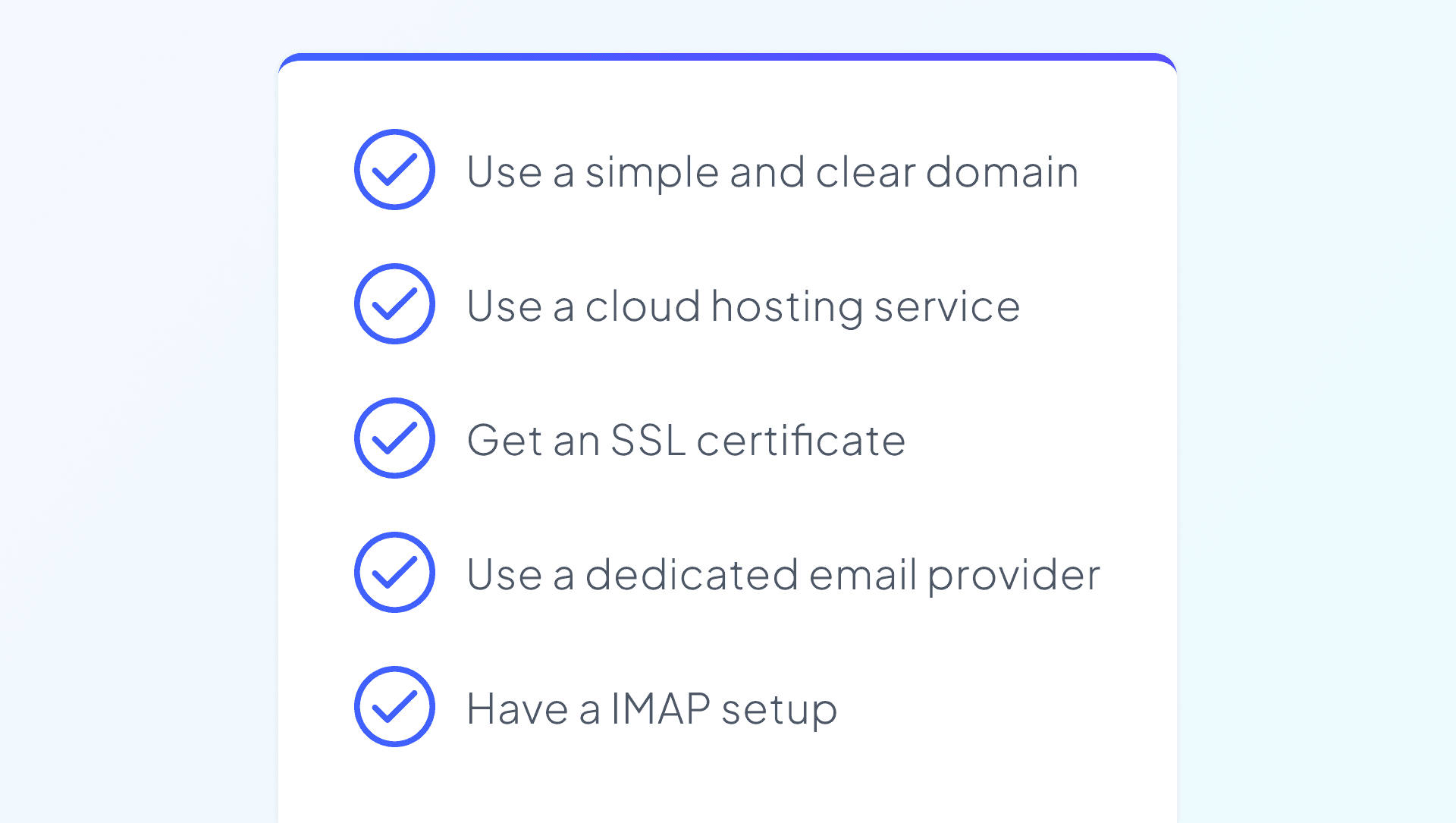
Of course, this isn't going to be the right choice for everyone, and we always recommend speaking to a website and/or IT expert to find out more about the options that are right for you.
If you want more help, or need to know more about Edge of the Web's hosting services, get in touch with us.

